Assessing the Relationship Between Authentic Leadership and PsyCap
VerifiedAdded on 2022/09/11
|9
|2710
|17
Essay
AI Summary
This essay delves into the intricate relationships between authentic leadership, Leader-Member Exchange (LMX), and employee psychological capital (PsyCap). It explores how authentic leadership, characterized by self-awareness, transparency, and ethical behavior, fosters trust and enhances employees' psychological capital, including optimism, resilience, and self-efficacy. The essay examines the connection between LMX, the quality of the leader-employee relationship, and PsyCap, highlighting how strong LMX can contribute to employees' positive psychological states. Furthermore, it investigates strategies for building PsyCap in different employee groups, recognizing the impact of emotions on performance and the importance of fostering a positive work environment. The discussion also covers generational cohorts and how they influence employee values and behaviors, emphasizing the significance of authentic leadership in promoting overall employee well-being and organizational success. The essay concludes by summarizing the key findings and emphasizing the crucial role of authentic leadership in cultivating a psychologically healthy and productive workplace.

qwertyuiopasdfghjklzxcvbnmqw
ertyuiopasdfghjklzxcvbnmqwert
yuiopasdfghjklzxcvbnmqwertyui
opasdfghjklzxcvbnmqwertyuiop
asdfghjklzxcvbnmqwertyuiopasd
fghjklzxcvbnmqwertyuiopasdfgh
jklzxcvbnmqwertyuiopasdfghjkl
zxcvbnmqwertyuiopasdfghjklzxc
vbnmqwertyuiopasdfghjklzxcvb
nmqwertyuiopasdfghjklzxcvbnm
qwertyuiopasdfghjklzxcvbnmqw
ertyuiopasdfghjklzxcvbnmqwert
yuiopasdfghjklzxcvbnmqwertyui
opasdfghjklzxcvbnmqwertyuiop
asdfghjklzxcvbnmqwertyuiopasd
fghjklzxcvbnmqwertyuiopasdfgh
jklzxcvbnmrtyuiopasdfghjklzxcv
The positive Leader
ertyuiopasdfghjklzxcvbnmqwert
yuiopasdfghjklzxcvbnmqwertyui
opasdfghjklzxcvbnmqwertyuiop
asdfghjklzxcvbnmqwertyuiopasd
fghjklzxcvbnmqwertyuiopasdfgh
jklzxcvbnmqwertyuiopasdfghjkl
zxcvbnmqwertyuiopasdfghjklzxc
vbnmqwertyuiopasdfghjklzxcvb
nmqwertyuiopasdfghjklzxcvbnm
qwertyuiopasdfghjklzxcvbnmqw
ertyuiopasdfghjklzxcvbnmqwert
yuiopasdfghjklzxcvbnmqwertyui
opasdfghjklzxcvbnmqwertyuiop
asdfghjklzxcvbnmqwertyuiopasd
fghjklzxcvbnmqwertyuiopasdfgh
jklzxcvbnmrtyuiopasdfghjklzxcv
The positive Leader
Paraphrase This Document
Need a fresh take? Get an instant paraphrase of this document with our AI Paraphraser
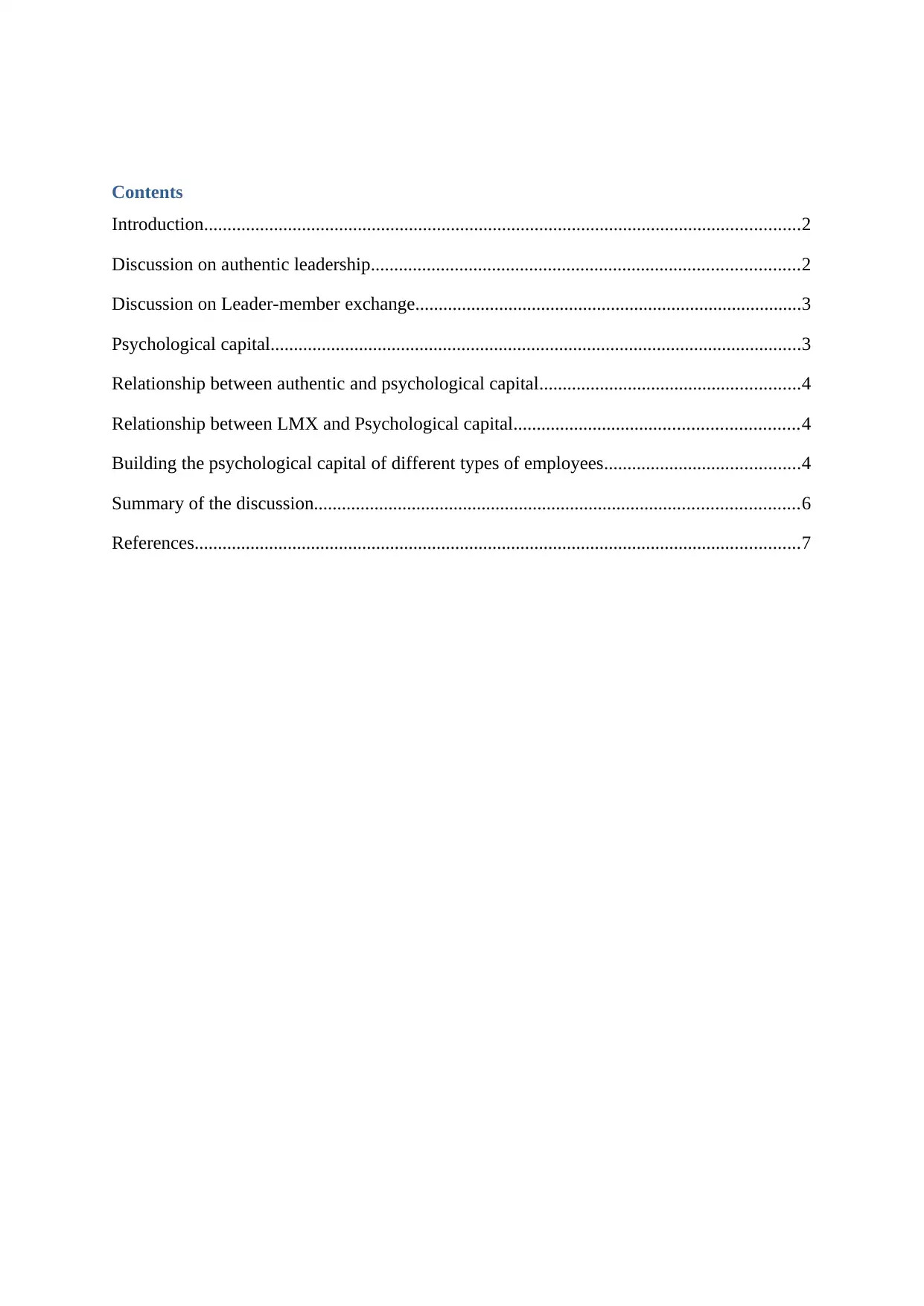
Contents
Introduction................................................................................................................................2
Discussion on authentic leadership............................................................................................2
Discussion on Leader-member exchange...................................................................................3
Psychological capital..................................................................................................................3
Relationship between authentic and psychological capital........................................................4
Relationship between LMX and Psychological capital.............................................................4
Building the psychological capital of different types of employees..........................................4
Summary of the discussion........................................................................................................6
References..................................................................................................................................7
Introduction................................................................................................................................2
Discussion on authentic leadership............................................................................................2
Discussion on Leader-member exchange...................................................................................3
Psychological capital..................................................................................................................3
Relationship between authentic and psychological capital........................................................4
Relationship between LMX and Psychological capital.............................................................4
Building the psychological capital of different types of employees..........................................4
Summary of the discussion........................................................................................................6
References..................................................................................................................................7
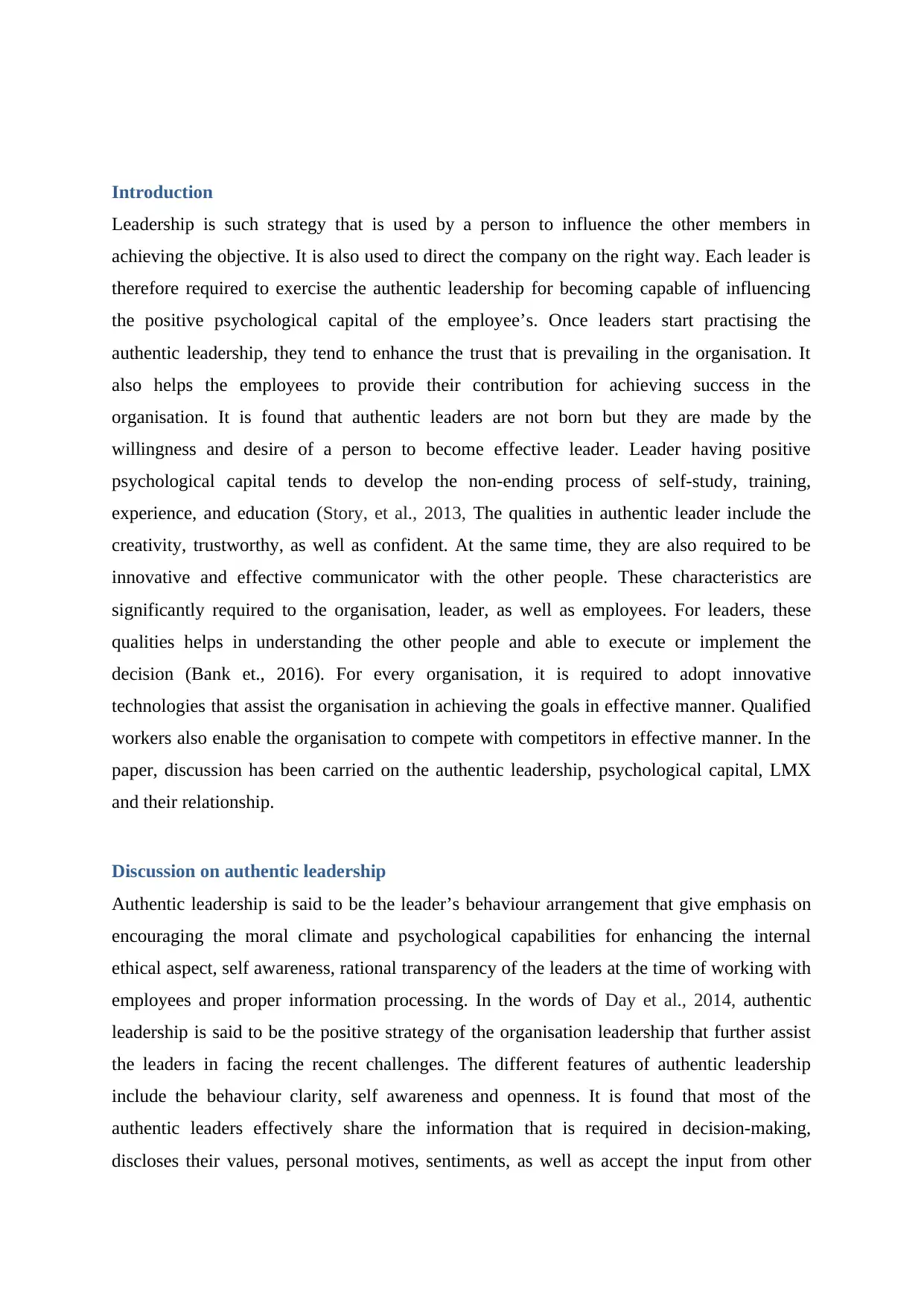
Introduction
Leadership is such strategy that is used by a person to influence the other members in
achieving the objective. It is also used to direct the company on the right way. Each leader is
therefore required to exercise the authentic leadership for becoming capable of influencing
the positive psychological capital of the employee’s. Once leaders start practising the
authentic leadership, they tend to enhance the trust that is prevailing in the organisation. It
also helps the employees to provide their contribution for achieving success in the
organisation. It is found that authentic leaders are not born but they are made by the
willingness and desire of a person to become effective leader. Leader having positive
psychological capital tends to develop the non-ending process of self-study, training,
experience, and education (Story, et al., 2013, The qualities in authentic leader include the
creativity, trustworthy, as well as confident. At the same time, they are also required to be
innovative and effective communicator with the other people. These characteristics are
significantly required to the organisation, leader, as well as employees. For leaders, these
qualities helps in understanding the other people and able to execute or implement the
decision (Bank et., 2016). For every organisation, it is required to adopt innovative
technologies that assist the organisation in achieving the goals in effective manner. Qualified
workers also enable the organisation to compete with competitors in effective manner. In the
paper, discussion has been carried on the authentic leadership, psychological capital, LMX
and their relationship.
Discussion on authentic leadership
Authentic leadership is said to be the leader’s behaviour arrangement that give emphasis on
encouraging the moral climate and psychological capabilities for enhancing the internal
ethical aspect, self awareness, rational transparency of the leaders at the time of working with
employees and proper information processing. In the words of Day et al., 2014, authentic
leadership is said to be the positive strategy of the organisation leadership that further assist
the leaders in facing the recent challenges. The different features of authentic leadership
include the behaviour clarity, self awareness and openness. It is found that most of the
authentic leaders effectively share the information that is required in decision-making,
discloses their values, personal motives, sentiments, as well as accept the input from other
Leadership is such strategy that is used by a person to influence the other members in
achieving the objective. It is also used to direct the company on the right way. Each leader is
therefore required to exercise the authentic leadership for becoming capable of influencing
the positive psychological capital of the employee’s. Once leaders start practising the
authentic leadership, they tend to enhance the trust that is prevailing in the organisation. It
also helps the employees to provide their contribution for achieving success in the
organisation. It is found that authentic leaders are not born but they are made by the
willingness and desire of a person to become effective leader. Leader having positive
psychological capital tends to develop the non-ending process of self-study, training,
experience, and education (Story, et al., 2013, The qualities in authentic leader include the
creativity, trustworthy, as well as confident. At the same time, they are also required to be
innovative and effective communicator with the other people. These characteristics are
significantly required to the organisation, leader, as well as employees. For leaders, these
qualities helps in understanding the other people and able to execute or implement the
decision (Bank et., 2016). For every organisation, it is required to adopt innovative
technologies that assist the organisation in achieving the goals in effective manner. Qualified
workers also enable the organisation to compete with competitors in effective manner. In the
paper, discussion has been carried on the authentic leadership, psychological capital, LMX
and their relationship.
Discussion on authentic leadership
Authentic leadership is said to be the leader’s behaviour arrangement that give emphasis on
encouraging the moral climate and psychological capabilities for enhancing the internal
ethical aspect, self awareness, rational transparency of the leaders at the time of working with
employees and proper information processing. In the words of Day et al., 2014, authentic
leadership is said to be the positive strategy of the organisation leadership that further assist
the leaders in facing the recent challenges. The different features of authentic leadership
include the behaviour clarity, self awareness and openness. It is found that most of the
authentic leaders effectively share the information that is required in decision-making,
discloses their values, personal motives, sentiments, as well as accept the input from other
⊘ This is a preview!⊘
Do you want full access?
Subscribe today to unlock all pages.

Trusted by 1+ million students worldwide
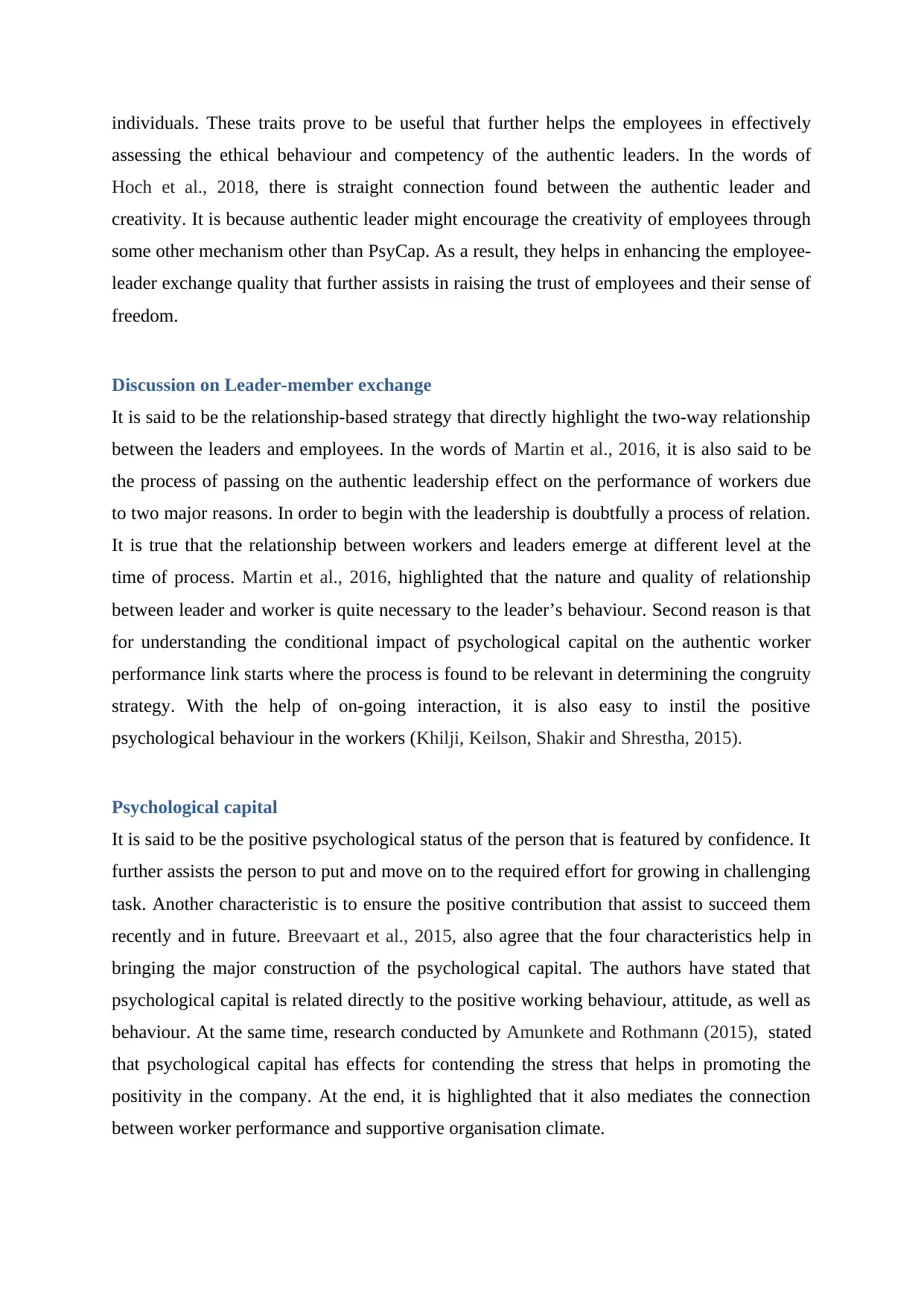
individuals. These traits prove to be useful that further helps the employees in effectively
assessing the ethical behaviour and competency of the authentic leaders. In the words of
Hoch et al., 2018, there is straight connection found between the authentic leader and
creativity. It is because authentic leader might encourage the creativity of employees through
some other mechanism other than PsyCap. As a result, they helps in enhancing the employee-
leader exchange quality that further assists in raising the trust of employees and their sense of
freedom.
Discussion on Leader-member exchange
It is said to be the relationship-based strategy that directly highlight the two-way relationship
between the leaders and employees. In the words of Martin et al., 2016, it is also said to be
the process of passing on the authentic leadership effect on the performance of workers due
to two major reasons. In order to begin with the leadership is doubtfully a process of relation.
It is true that the relationship between workers and leaders emerge at different level at the
time of process. Martin et al., 2016, highlighted that the nature and quality of relationship
between leader and worker is quite necessary to the leader’s behaviour. Second reason is that
for understanding the conditional impact of psychological capital on the authentic worker
performance link starts where the process is found to be relevant in determining the congruity
strategy. With the help of on-going interaction, it is also easy to instil the positive
psychological behaviour in the workers (Khilji, Keilson, Shakir and Shrestha, 2015).
Psychological capital
It is said to be the positive psychological status of the person that is featured by confidence. It
further assists the person to put and move on to the required effort for growing in challenging
task. Another characteristic is to ensure the positive contribution that assist to succeed them
recently and in future. Breevaart et al., 2015, also agree that the four characteristics help in
bringing the major construction of the psychological capital. The authors have stated that
psychological capital is related directly to the positive working behaviour, attitude, as well as
behaviour. At the same time, research conducted by Amunkete and Rothmann (2015), stated
that psychological capital has effects for contending the stress that helps in promoting the
positivity in the company. At the end, it is highlighted that it also mediates the connection
between worker performance and supportive organisation climate.
assessing the ethical behaviour and competency of the authentic leaders. In the words of
Hoch et al., 2018, there is straight connection found between the authentic leader and
creativity. It is because authentic leader might encourage the creativity of employees through
some other mechanism other than PsyCap. As a result, they helps in enhancing the employee-
leader exchange quality that further assists in raising the trust of employees and their sense of
freedom.
Discussion on Leader-member exchange
It is said to be the relationship-based strategy that directly highlight the two-way relationship
between the leaders and employees. In the words of Martin et al., 2016, it is also said to be
the process of passing on the authentic leadership effect on the performance of workers due
to two major reasons. In order to begin with the leadership is doubtfully a process of relation.
It is true that the relationship between workers and leaders emerge at different level at the
time of process. Martin et al., 2016, highlighted that the nature and quality of relationship
between leader and worker is quite necessary to the leader’s behaviour. Second reason is that
for understanding the conditional impact of psychological capital on the authentic worker
performance link starts where the process is found to be relevant in determining the congruity
strategy. With the help of on-going interaction, it is also easy to instil the positive
psychological behaviour in the workers (Khilji, Keilson, Shakir and Shrestha, 2015).
Psychological capital
It is said to be the positive psychological status of the person that is featured by confidence. It
further assists the person to put and move on to the required effort for growing in challenging
task. Another characteristic is to ensure the positive contribution that assist to succeed them
recently and in future. Breevaart et al., 2015, also agree that the four characteristics help in
bringing the major construction of the psychological capital. The authors have stated that
psychological capital is related directly to the positive working behaviour, attitude, as well as
behaviour. At the same time, research conducted by Amunkete and Rothmann (2015), stated
that psychological capital has effects for contending the stress that helps in promoting the
positivity in the company. At the end, it is highlighted that it also mediates the connection
between worker performance and supportive organisation climate.
Paraphrase This Document
Need a fresh take? Get an instant paraphrase of this document with our AI Paraphraser
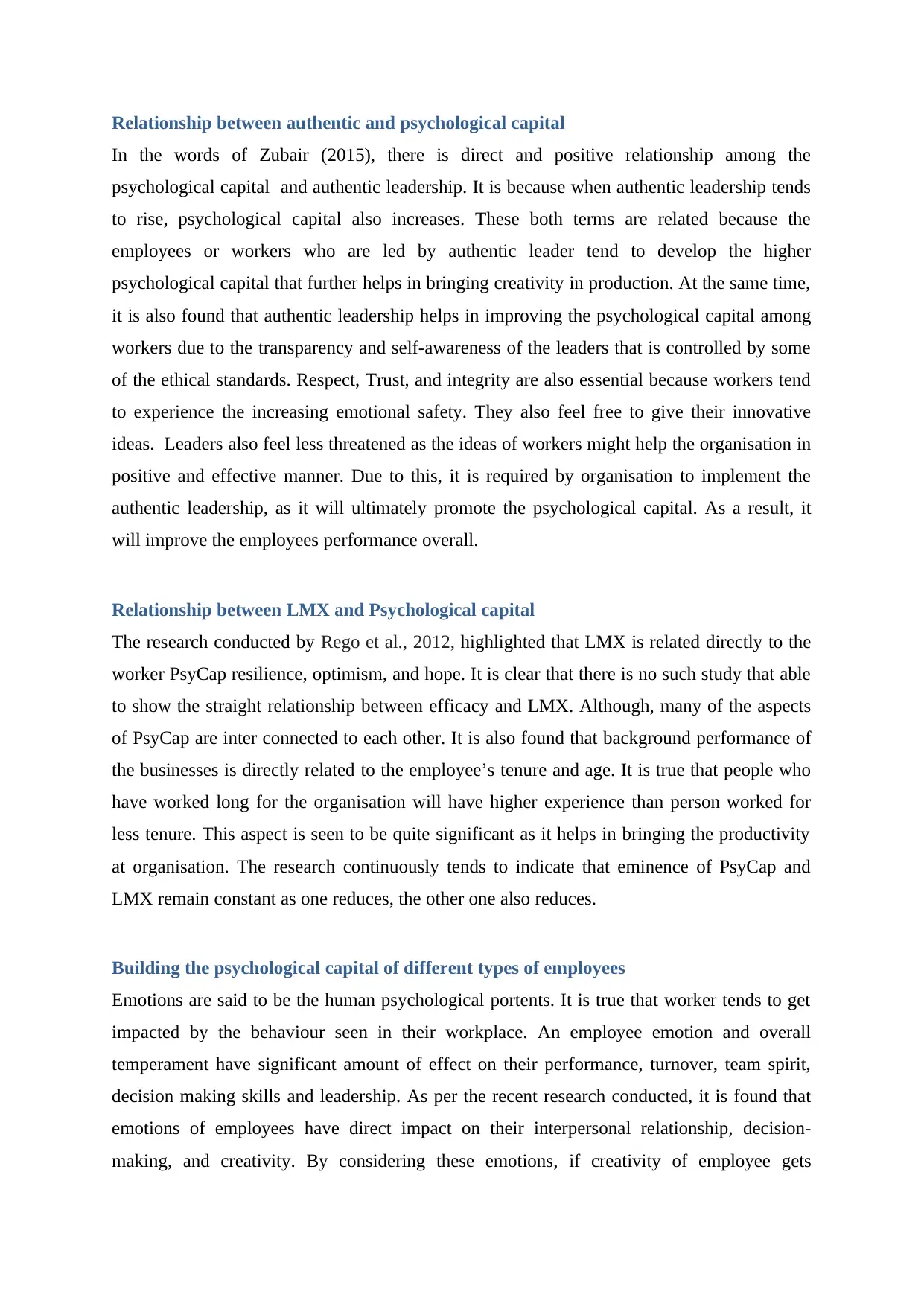
Relationship between authentic and psychological capital
In the words of Zubair (2015), there is direct and positive relationship among the
psychological capital and authentic leadership. It is because when authentic leadership tends
to rise, psychological capital also increases. These both terms are related because the
employees or workers who are led by authentic leader tend to develop the higher
psychological capital that further helps in bringing creativity in production. At the same time,
it is also found that authentic leadership helps in improving the psychological capital among
workers due to the transparency and self-awareness of the leaders that is controlled by some
of the ethical standards. Respect, Trust, and integrity are also essential because workers tend
to experience the increasing emotional safety. They also feel free to give their innovative
ideas. Leaders also feel less threatened as the ideas of workers might help the organisation in
positive and effective manner. Due to this, it is required by organisation to implement the
authentic leadership, as it will ultimately promote the psychological capital. As a result, it
will improve the employees performance overall.
Relationship between LMX and Psychological capital
The research conducted by Rego et al., 2012, highlighted that LMX is related directly to the
worker PsyCap resilience, optimism, and hope. It is clear that there is no such study that able
to show the straight relationship between efficacy and LMX. Although, many of the aspects
of PsyCap are inter connected to each other. It is also found that background performance of
the businesses is directly related to the employee’s tenure and age. It is true that people who
have worked long for the organisation will have higher experience than person worked for
less tenure. This aspect is seen to be quite significant as it helps in bringing the productivity
at organisation. The research continuously tends to indicate that eminence of PsyCap and
LMX remain constant as one reduces, the other one also reduces.
Building the psychological capital of different types of employees
Emotions are said to be the human psychological portents. It is true that worker tends to get
impacted by the behaviour seen in their workplace. An employee emotion and overall
temperament have significant amount of effect on their performance, turnover, team spirit,
decision making skills and leadership. As per the recent research conducted, it is found that
emotions of employees have direct impact on their interpersonal relationship, decision-
making, and creativity. By considering these emotions, if creativity of employee gets
In the words of Zubair (2015), there is direct and positive relationship among the
psychological capital and authentic leadership. It is because when authentic leadership tends
to rise, psychological capital also increases. These both terms are related because the
employees or workers who are led by authentic leader tend to develop the higher
psychological capital that further helps in bringing creativity in production. At the same time,
it is also found that authentic leadership helps in improving the psychological capital among
workers due to the transparency and self-awareness of the leaders that is controlled by some
of the ethical standards. Respect, Trust, and integrity are also essential because workers tend
to experience the increasing emotional safety. They also feel free to give their innovative
ideas. Leaders also feel less threatened as the ideas of workers might help the organisation in
positive and effective manner. Due to this, it is required by organisation to implement the
authentic leadership, as it will ultimately promote the psychological capital. As a result, it
will improve the employees performance overall.
Relationship between LMX and Psychological capital
The research conducted by Rego et al., 2012, highlighted that LMX is related directly to the
worker PsyCap resilience, optimism, and hope. It is clear that there is no such study that able
to show the straight relationship between efficacy and LMX. Although, many of the aspects
of PsyCap are inter connected to each other. It is also found that background performance of
the businesses is directly related to the employee’s tenure and age. It is true that people who
have worked long for the organisation will have higher experience than person worked for
less tenure. This aspect is seen to be quite significant as it helps in bringing the productivity
at organisation. The research continuously tends to indicate that eminence of PsyCap and
LMX remain constant as one reduces, the other one also reduces.
Building the psychological capital of different types of employees
Emotions are said to be the human psychological portents. It is true that worker tends to get
impacted by the behaviour seen in their workplace. An employee emotion and overall
temperament have significant amount of effect on their performance, turnover, team spirit,
decision making skills and leadership. As per the recent research conducted, it is found that
emotions of employees have direct impact on their interpersonal relationship, decision-
making, and creativity. By considering these emotions, if creativity of employee gets
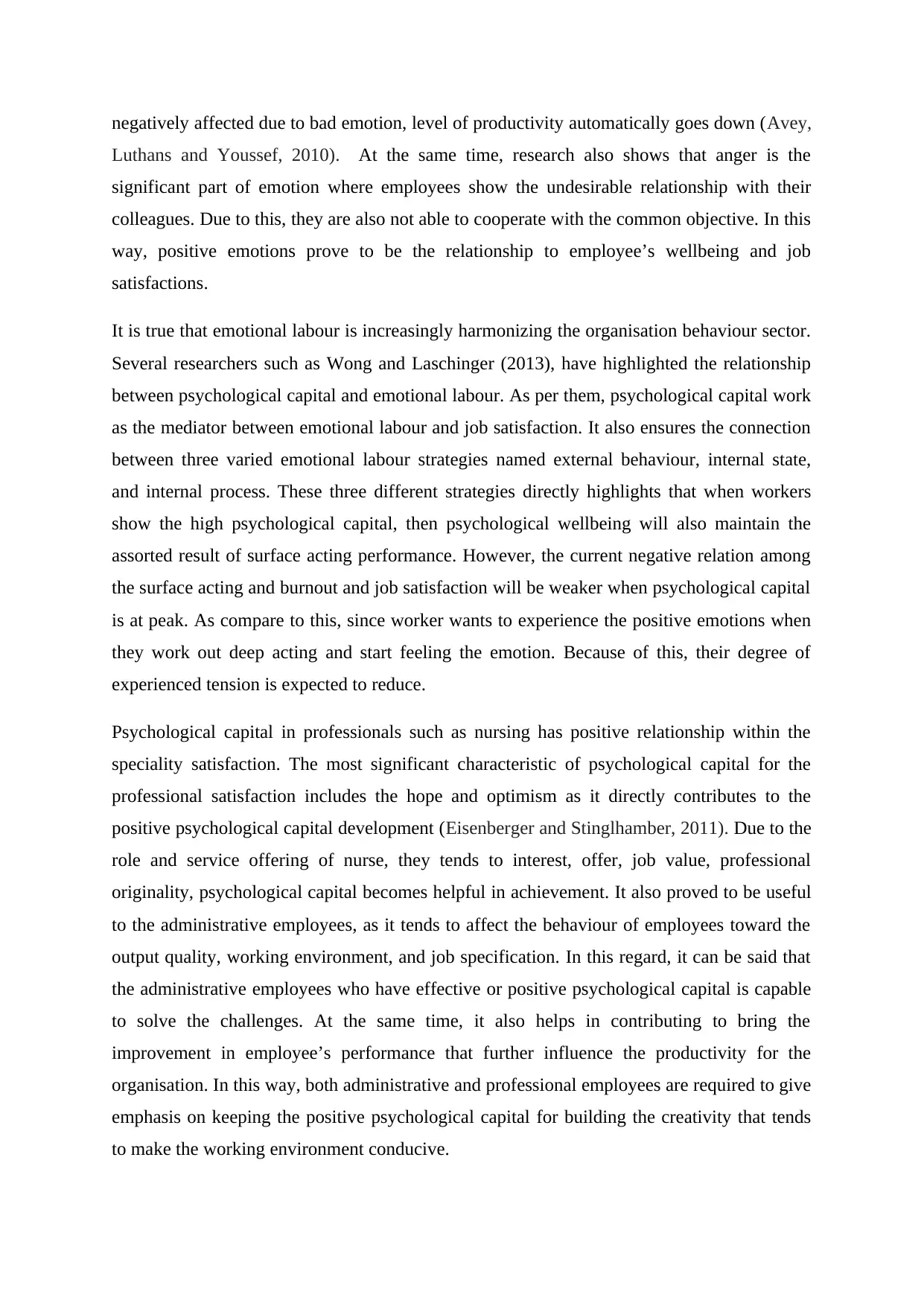
negatively affected due to bad emotion, level of productivity automatically goes down (Avey,
Luthans and Youssef, 2010). At the same time, research also shows that anger is the
significant part of emotion where employees show the undesirable relationship with their
colleagues. Due to this, they are also not able to cooperate with the common objective. In this
way, positive emotions prove to be the relationship to employee’s wellbeing and job
satisfactions.
It is true that emotional labour is increasingly harmonizing the organisation behaviour sector.
Several researchers such as Wong and Laschinger (2013), have highlighted the relationship
between psychological capital and emotional labour. As per them, psychological capital work
as the mediator between emotional labour and job satisfaction. It also ensures the connection
between three varied emotional labour strategies named external behaviour, internal state,
and internal process. These three different strategies directly highlights that when workers
show the high psychological capital, then psychological wellbeing will also maintain the
assorted result of surface acting performance. However, the current negative relation among
the surface acting and burnout and job satisfaction will be weaker when psychological capital
is at peak. As compare to this, since worker wants to experience the positive emotions when
they work out deep acting and start feeling the emotion. Because of this, their degree of
experienced tension is expected to reduce.
Psychological capital in professionals such as nursing has positive relationship within the
speciality satisfaction. The most significant characteristic of psychological capital for the
professional satisfaction includes the hope and optimism as it directly contributes to the
positive psychological capital development (Eisenberger and Stinglhamber, 2011). Due to the
role and service offering of nurse, they tends to interest, offer, job value, professional
originality, psychological capital becomes helpful in achievement. It also proved to be useful
to the administrative employees, as it tends to affect the behaviour of employees toward the
output quality, working environment, and job specification. In this regard, it can be said that
the administrative employees who have effective or positive psychological capital is capable
to solve the challenges. At the same time, it also helps in contributing to bring the
improvement in employee’s performance that further influence the productivity for the
organisation. In this way, both administrative and professional employees are required to give
emphasis on keeping the positive psychological capital for building the creativity that tends
to make the working environment conducive.
Luthans and Youssef, 2010). At the same time, research also shows that anger is the
significant part of emotion where employees show the undesirable relationship with their
colleagues. Due to this, they are also not able to cooperate with the common objective. In this
way, positive emotions prove to be the relationship to employee’s wellbeing and job
satisfactions.
It is true that emotional labour is increasingly harmonizing the organisation behaviour sector.
Several researchers such as Wong and Laschinger (2013), have highlighted the relationship
between psychological capital and emotional labour. As per them, psychological capital work
as the mediator between emotional labour and job satisfaction. It also ensures the connection
between three varied emotional labour strategies named external behaviour, internal state,
and internal process. These three different strategies directly highlights that when workers
show the high psychological capital, then psychological wellbeing will also maintain the
assorted result of surface acting performance. However, the current negative relation among
the surface acting and burnout and job satisfaction will be weaker when psychological capital
is at peak. As compare to this, since worker wants to experience the positive emotions when
they work out deep acting and start feeling the emotion. Because of this, their degree of
experienced tension is expected to reduce.
Psychological capital in professionals such as nursing has positive relationship within the
speciality satisfaction. The most significant characteristic of psychological capital for the
professional satisfaction includes the hope and optimism as it directly contributes to the
positive psychological capital development (Eisenberger and Stinglhamber, 2011). Due to the
role and service offering of nurse, they tends to interest, offer, job value, professional
originality, psychological capital becomes helpful in achievement. It also proved to be useful
to the administrative employees, as it tends to affect the behaviour of employees toward the
output quality, working environment, and job specification. In this regard, it can be said that
the administrative employees who have effective or positive psychological capital is capable
to solve the challenges. At the same time, it also helps in contributing to bring the
improvement in employee’s performance that further influence the productivity for the
organisation. In this way, both administrative and professional employees are required to give
emphasis on keeping the positive psychological capital for building the creativity that tends
to make the working environment conducive.
⊘ This is a preview!⊘
Do you want full access?
Subscribe today to unlock all pages.

Trusted by 1+ million students worldwide
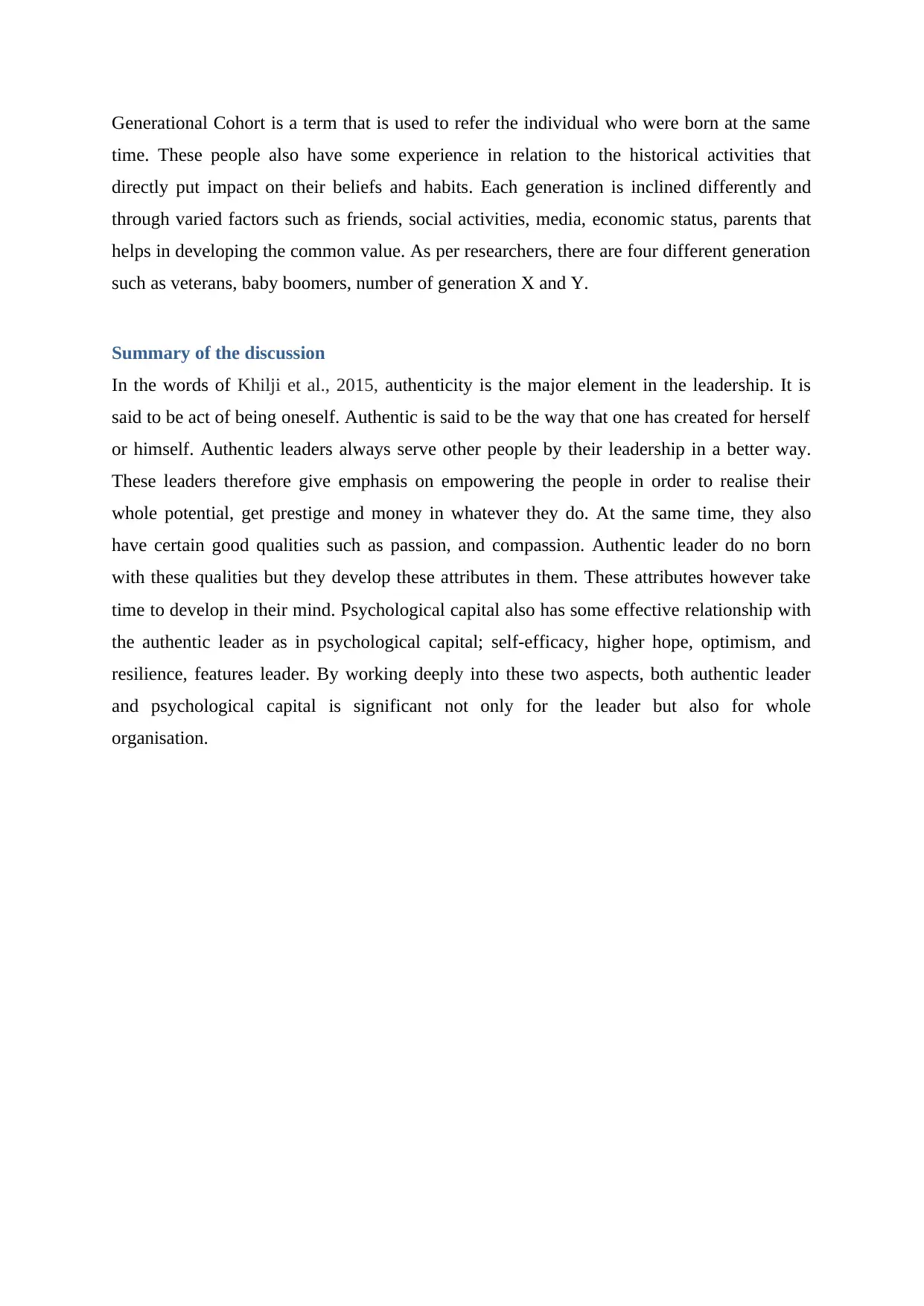
Generational Cohort is a term that is used to refer the individual who were born at the same
time. These people also have some experience in relation to the historical activities that
directly put impact on their beliefs and habits. Each generation is inclined differently and
through varied factors such as friends, social activities, media, economic status, parents that
helps in developing the common value. As per researchers, there are four different generation
such as veterans, baby boomers, number of generation X and Y.
Summary of the discussion
In the words of Khilji et al., 2015, authenticity is the major element in the leadership. It is
said to be act of being oneself. Authentic is said to be the way that one has created for herself
or himself. Authentic leaders always serve other people by their leadership in a better way.
These leaders therefore give emphasis on empowering the people in order to realise their
whole potential, get prestige and money in whatever they do. At the same time, they also
have certain good qualities such as passion, and compassion. Authentic leader do no born
with these qualities but they develop these attributes in them. These attributes however take
time to develop in their mind. Psychological capital also has some effective relationship with
the authentic leader as in psychological capital; self-efficacy, higher hope, optimism, and
resilience, features leader. By working deeply into these two aspects, both authentic leader
and psychological capital is significant not only for the leader but also for whole
organisation.
time. These people also have some experience in relation to the historical activities that
directly put impact on their beliefs and habits. Each generation is inclined differently and
through varied factors such as friends, social activities, media, economic status, parents that
helps in developing the common value. As per researchers, there are four different generation
such as veterans, baby boomers, number of generation X and Y.
Summary of the discussion
In the words of Khilji et al., 2015, authenticity is the major element in the leadership. It is
said to be act of being oneself. Authentic is said to be the way that one has created for herself
or himself. Authentic leaders always serve other people by their leadership in a better way.
These leaders therefore give emphasis on empowering the people in order to realise their
whole potential, get prestige and money in whatever they do. At the same time, they also
have certain good qualities such as passion, and compassion. Authentic leader do no born
with these qualities but they develop these attributes in them. These attributes however take
time to develop in their mind. Psychological capital also has some effective relationship with
the authentic leader as in psychological capital; self-efficacy, higher hope, optimism, and
resilience, features leader. By working deeply into these two aspects, both authentic leader
and psychological capital is significant not only for the leader but also for whole
organisation.
Paraphrase This Document
Need a fresh take? Get an instant paraphrase of this document with our AI Paraphraser
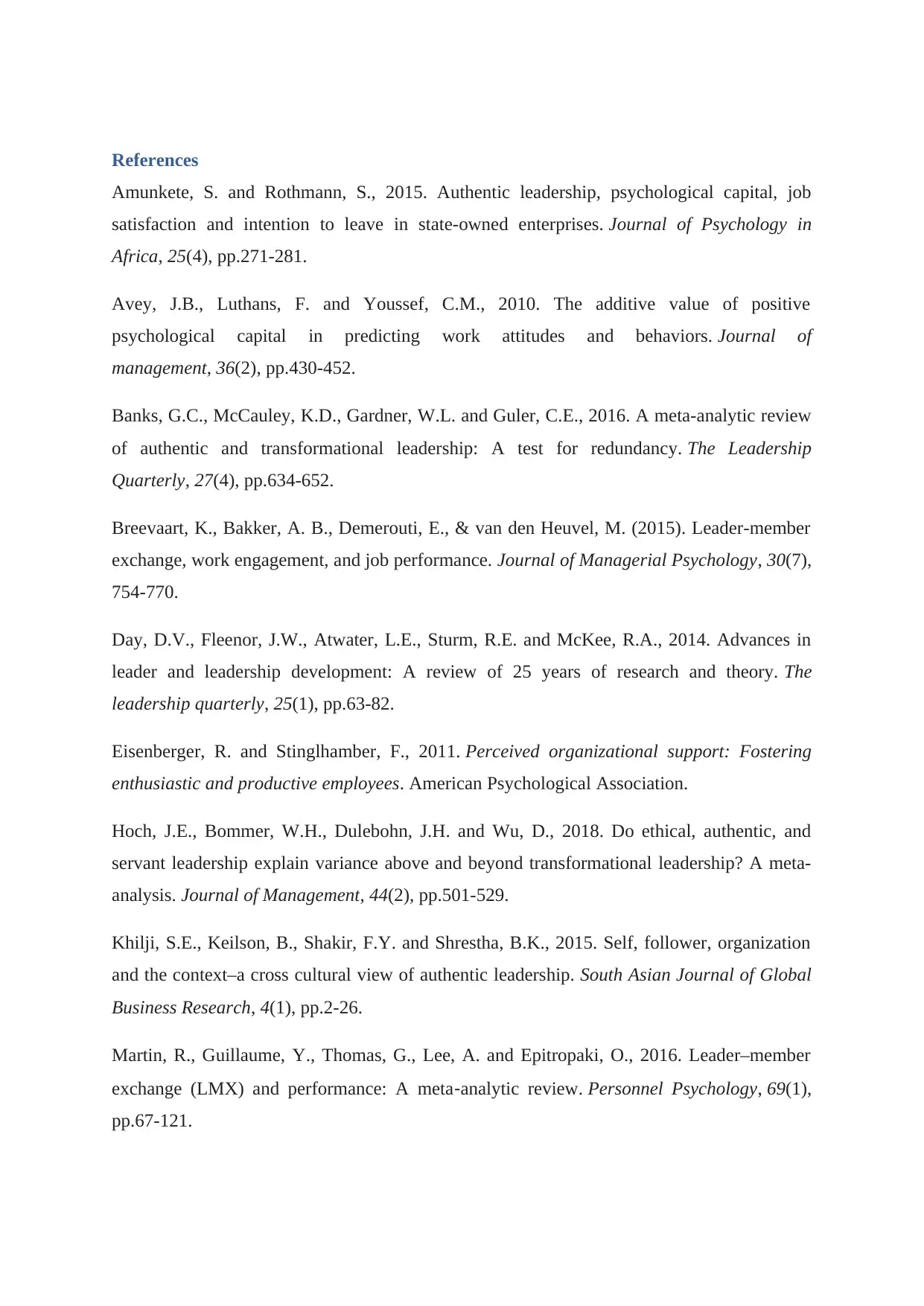
References
Amunkete, S. and Rothmann, S., 2015. Authentic leadership, psychological capital, job
satisfaction and intention to leave in state-owned enterprises. Journal of Psychology in
Africa, 25(4), pp.271-281.
Avey, J.B., Luthans, F. and Youssef, C.M., 2010. The additive value of positive
psychological capital in predicting work attitudes and behaviors. Journal of
management, 36(2), pp.430-452.
Banks, G.C., McCauley, K.D., Gardner, W.L. and Guler, C.E., 2016. A meta-analytic review
of authentic and transformational leadership: A test for redundancy. The Leadership
Quarterly, 27(4), pp.634-652.
Breevaart, K., Bakker, A. B., Demerouti, E., & van den Heuvel, M. (2015). Leader-member
exchange, work engagement, and job performance. Journal of Managerial Psychology, 30(7),
754-770.
Day, D.V., Fleenor, J.W., Atwater, L.E., Sturm, R.E. and McKee, R.A., 2014. Advances in
leader and leadership development: A review of 25 years of research and theory. The
leadership quarterly, 25(1), pp.63-82.
Eisenberger, R. and Stinglhamber, F., 2011. Perceived organizational support: Fostering
enthusiastic and productive employees. American Psychological Association.
Hoch, J.E., Bommer, W.H., Dulebohn, J.H. and Wu, D., 2018. Do ethical, authentic, and
servant leadership explain variance above and beyond transformational leadership? A meta-
analysis. Journal of Management, 44(2), pp.501-529.
Khilji, S.E., Keilson, B., Shakir, F.Y. and Shrestha, B.K., 2015. Self, follower, organization
and the context–a cross cultural view of authentic leadership. South Asian Journal of Global
Business Research, 4(1), pp.2-26.
Martin, R., Guillaume, Y., Thomas, G., Lee, A. and Epitropaki, O., 2016. Leader–member
exchange (LMX) and performance: A meta‐analytic review. Personnel Psychology, 69(1),
pp.67-121.
Amunkete, S. and Rothmann, S., 2015. Authentic leadership, psychological capital, job
satisfaction and intention to leave in state-owned enterprises. Journal of Psychology in
Africa, 25(4), pp.271-281.
Avey, J.B., Luthans, F. and Youssef, C.M., 2010. The additive value of positive
psychological capital in predicting work attitudes and behaviors. Journal of
management, 36(2), pp.430-452.
Banks, G.C., McCauley, K.D., Gardner, W.L. and Guler, C.E., 2016. A meta-analytic review
of authentic and transformational leadership: A test for redundancy. The Leadership
Quarterly, 27(4), pp.634-652.
Breevaart, K., Bakker, A. B., Demerouti, E., & van den Heuvel, M. (2015). Leader-member
exchange, work engagement, and job performance. Journal of Managerial Psychology, 30(7),
754-770.
Day, D.V., Fleenor, J.W., Atwater, L.E., Sturm, R.E. and McKee, R.A., 2014. Advances in
leader and leadership development: A review of 25 years of research and theory. The
leadership quarterly, 25(1), pp.63-82.
Eisenberger, R. and Stinglhamber, F., 2011. Perceived organizational support: Fostering
enthusiastic and productive employees. American Psychological Association.
Hoch, J.E., Bommer, W.H., Dulebohn, J.H. and Wu, D., 2018. Do ethical, authentic, and
servant leadership explain variance above and beyond transformational leadership? A meta-
analysis. Journal of Management, 44(2), pp.501-529.
Khilji, S.E., Keilson, B., Shakir, F.Y. and Shrestha, B.K., 2015. Self, follower, organization
and the context–a cross cultural view of authentic leadership. South Asian Journal of Global
Business Research, 4(1), pp.2-26.
Martin, R., Guillaume, Y., Thomas, G., Lee, A. and Epitropaki, O., 2016. Leader–member
exchange (LMX) and performance: A meta‐analytic review. Personnel Psychology, 69(1),
pp.67-121.
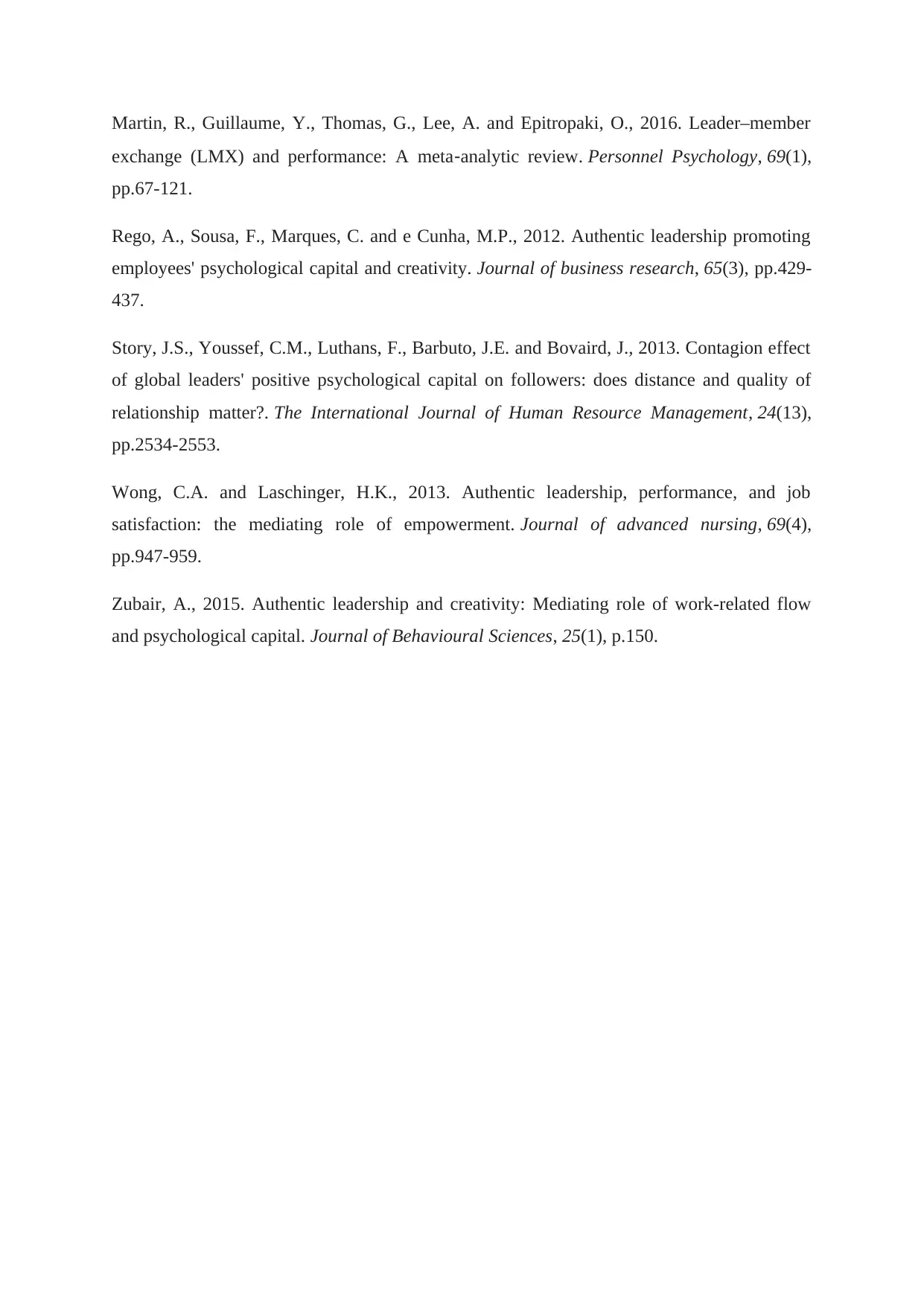
Martin, R., Guillaume, Y., Thomas, G., Lee, A. and Epitropaki, O., 2016. Leader–member
exchange (LMX) and performance: A meta‐analytic review. Personnel Psychology, 69(1),
pp.67-121.
Rego, A., Sousa, F., Marques, C. and e Cunha, M.P., 2012. Authentic leadership promoting
employees' psychological capital and creativity. Journal of business research, 65(3), pp.429-
437.
Story, J.S., Youssef, C.M., Luthans, F., Barbuto, J.E. and Bovaird, J., 2013. Contagion effect
of global leaders' positive psychological capital on followers: does distance and quality of
relationship matter?. The International Journal of Human Resource Management, 24(13),
pp.2534-2553.
Wong, C.A. and Laschinger, H.K., 2013. Authentic leadership, performance, and job
satisfaction: the mediating role of empowerment. Journal of advanced nursing, 69(4),
pp.947-959.
Zubair, A., 2015. Authentic leadership and creativity: Mediating role of work-related flow
and psychological capital. Journal of Behavioural Sciences, 25(1), p.150.
exchange (LMX) and performance: A meta‐analytic review. Personnel Psychology, 69(1),
pp.67-121.
Rego, A., Sousa, F., Marques, C. and e Cunha, M.P., 2012. Authentic leadership promoting
employees' psychological capital and creativity. Journal of business research, 65(3), pp.429-
437.
Story, J.S., Youssef, C.M., Luthans, F., Barbuto, J.E. and Bovaird, J., 2013. Contagion effect
of global leaders' positive psychological capital on followers: does distance and quality of
relationship matter?. The International Journal of Human Resource Management, 24(13),
pp.2534-2553.
Wong, C.A. and Laschinger, H.K., 2013. Authentic leadership, performance, and job
satisfaction: the mediating role of empowerment. Journal of advanced nursing, 69(4),
pp.947-959.
Zubair, A., 2015. Authentic leadership and creativity: Mediating role of work-related flow
and psychological capital. Journal of Behavioural Sciences, 25(1), p.150.
⊘ This is a preview!⊘
Do you want full access?
Subscribe today to unlock all pages.

Trusted by 1+ million students worldwide
1 out of 9
Related Documents
Your All-in-One AI-Powered Toolkit for Academic Success.
+13062052269
info@desklib.com
Available 24*7 on WhatsApp / Email
![[object Object]](/_next/static/media/star-bottom.7253800d.svg)
Unlock your academic potential
Copyright © 2020–2026 A2Z Services. All Rights Reserved. Developed and managed by ZUCOL.





